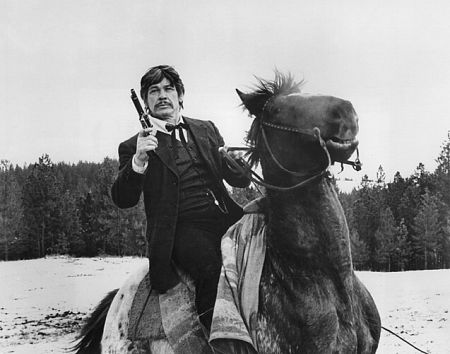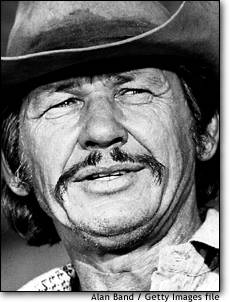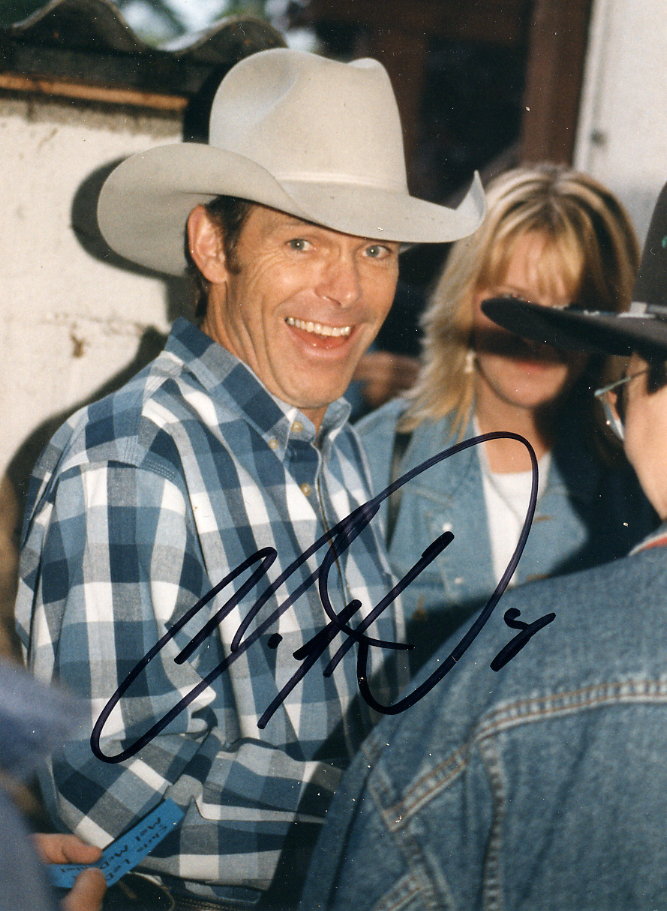Click here to find out more!
Pancho Villa, encouraged LeDoux to ride horses on his Wyoming farm. LeDoux attended high school in Cheyenne, Wyo., and while still at school, he twice won the state's bareback title. In 1967, after graduating, he won a rodeo scholarship and received a national title in his third year. In 1976, he became the Professional Rodeo Cowboys Association's (PRCA) world champion in bareback riding.
LeDoux has been playing guitar and harmonica and writing songs since his teens, and he used his musical ability as a means of paying his way from one rodeo to another. Since 1971, he has been recording songs about "real cowboys," and his albums combine his own compositions about rodeo life with old and new cowboy songs. He describes his music as "a combination of western soul, sagebrush blues, cowboy folk and rodeo rock 'n' roll."
Charlie Daniels, Johnny Gimble and Janie Frickie are among the musicians who have appeared on his records, and Garth Brooks famously paid tribute to him in "Much Too Young (To Feel This Damn Old)." He and Brooks also teamed for the Top 10 hit, "Whatcha Gonna Do With a Cowboy," in 1992.
In October 2000, after being ill for some time, he underwent a liver transplant. In 2003, he released the album Horsepower and celebrated career sales of more than 5 million albums.
LeDoux, 56, died March 9, 2005, from complications of liver cancer.
Charles Bronson died in Los Angeles on Saturday,
August 30,2003 of pneumonia at the age of 81.

Charles Bronson, the grim-faced tough guy who built a European following before making his mark in the United States with action films including the "Death Wish" series, died Saturday of pneumonia. He was 81.
During the height of his career, Bronson was hugely popular in Europe; the French knew him as "le sacre monstre" (the sacred monster), the Italians as "Il Brutto" (the ugly man). In 1971, he was presented a Golden Globe as "the most popular actor in the world."
Like Clint Eastwood, whose spaghetti westerns won him stardom, Bronson had to make European films to prove his worth as a star. He left a featured-role career in Hollywood to play leads in films made in France, Italy and Spain. His blunt manner, powerful build and air of danger made him the most popular actor in those countries.
At age 50, he returned to Hollywood a star.
He was born Charles Buchinsky on Nov. 3, 1921 -- not 1922, as studio biographies claimed -- in Ehrenfeld, Pa. He was the 11th of 15 children of a coal miner and his wife, both Lithuanian immigrants.
Drafted in 1943, he served with the Air Force in the Pacific, reportedly as a tail gunner on a B29.
As Charles Buchinsky or Buchinski, he played supporting roles in "Red Skies of Montana," "The Marrying Kind," "Pat and Mike" (in which he fell victim to Katharine Hepburn's judo), and other films. In 1954 he changed his last name, fearing reaction in the McCarthy era to Russian-sounding names.
His most controversial film came in 1974 with "Death Wish." As an affluent, liberal architect, Bronson's life is shattered when young thugs kill his wife and rape his daughter. He vows to rid the city of such vermin, and his executions brought cheers from crime-weary audiences.

Country Music Rebel Waylon Jennings Dead at 64 LOS ANGELES (Reuters) - Hellraising country music icon Waylon Jennings, who escaped death by giving up his seat on Buddy Holly's plane and helped launch Nashville's "outlaw" movement with Willie Nelson, died on Wednesday. He was 64. The deep-voiced Texas troubadour "died very peacefully in his sleep" at his home outside Phoenix, Arizona, spokeswoman Schatzi Hageman said. Jennings had battled diabetes and related illnesses, and last year had his left foot amputated. Nonetheless he still had concert dates booked for the coming months. Disillusioned by country music's slickness in the early 1970s, Jennings brought a rock 'n' roll sensibility to the genre and crossed over to mainstream fans. He enjoyed such hit songs as "Luckenbach, Texas" "Good Hearted Woman" and the Grammy-winning duet with Willie Nelson, "Mammas Don't Let Your Babies Grow Up To Be Cowboys." His 1976 album, "Wanted: The Outlaws," which also featured his wife, Jessi Colter, Nelson and singer-producer Tompall Glaser, was the first country album to be certified platinum. He also wrote the popular theme to the 1970s television series "The Dukes of Hazzard." Overall, the two-time Grammy-winner recorded dozens of albums and had 16 No. 1 country singles in a career spanning five decades. Jennings lived an appropriate wild life in his younger days. In the late 1960s, he shared an apartment in Nashville with Johnny Cash after their respective marriages had broken up, and the duo lived high on methamphetamines and general destruction. After Cash remarried and got sober, Jennings complained in 1974 that Cash had "sold out to religion." Jennings, too, gave up the drugs, but as recently as 2000 he said religion could be "a bad crutch." Jennings enjoyed 16 No. 1 hits and also won a Grammy Award for his 1968 cover of "MacArthur Park." He was inducted into the Country Music Hall of Fame last October, but was too ill to attend. Ill-health had plagued him since the late 1980s when he had a triple heart by-pass, and he was forced to use a wheelchair in recent months. "For Waylon, it was always about the music," said Joe Galante, chairman of the RCA Label Group/Nashville, which was Jennings recording home for many years. "The only spotlight he ever cared about was the one on him while he was on stage. It wasn't about the awards or events. He was an original and a pioneer in terms of creating his own sound. This is a great loss for the music world." In the mid 1980s, he and Nelson formed the Highwaymen, a "superstar" quartet that also included Cash and Kris Kristofferson. TWIST OF FATE Born June 15, 1937, in Littlefield, Texas, and raised on the music of Jimmie Rodgers and B.B. King, Jennings got an early start in the industry. He became a radio DJ at the age of 12, dropped out of high school in the 10th grade and befriended fellow Texan Buddy Holly after moving to Lubbock to work at a station there. Jennings credited the rock 'n' roll pioneer with bestowing "attitude" upon him. "He loved music, and he taught me that it shouldn't have any barriers to it," Jennings once said. Holly produced Jennings' first album and hired him as a bass player for his 1959 tour of the Midwest with Ritchie Valens and J.P. "the Big Bopper" Richardson. After a Feb. 2 show in Clear Lake, Iowa, an exhausted Holly chartered a small plane to get to the next gig. Jennings gave up his seat to the Big Bopper, who was suffering from the 'flu and did not want to ride in the bus. The plane crashed soon after takeoff in the early hours of Feb. 3, killing Holly, Valens and the Big Bopper. For years Jennings was haunted by a joking exchange he had had with Holly, as he related in VH1's "Behind The Music." "Buddy was leaning back against the wall in this cane-bottom chair laughing at me. He says, 'You're not going on the plane tonight, huh?' I said, 'No.' He said, 'Well, I hope your bus freezes up.' And I said, 'Well, I hope your plane crashes.' I was awful young, and it took me a long time to get over that." Jennings formed his own group, the Waylors, in 1963, and developed his own style by merging a soulful vocal with an eclectic repertoire. He was signed to RCA Records by Chet Atkins and had top five hits in 1968 with "The Only Daddy That'll Walk The Line" and "Walk Out On My Mind." He recorded several songs for the soundtrack album of "Ned Kelly," which starred Rolling Stone Mick Jagger. OUTLAW ROOTS Despite his success, Jennings never fit into the Nashville's pop-influenced hit-making machine, where the songwriters and producers held sway over the artists. He started producing his own records, hiring his own musicians and stripped the music to its honky-tonk and western swing roots. Albums like "Ladies Love Outlaws" (1972) and "Honky Tonk Heroes" (1973) helped pave the way for the "outlaw" movement, an informal grouping with a fluid membership of artists who came and went. He and Nelson also recorded three duet albums. This new form of progressive country music expanded the market for the country genre and sowed the seeds for the country megastars who would burst onto the scene two decades later. By that stage, country veterans like Jennings and Cash were out of favor on country music radio, as the genre reverted to its slick stylings. Jennings' later albums were inconsistent. His latest album was titled "Never Say Die, LIVE." Jennings also starred in a number of film and TV projects, including "Married ... With Children," in which he played a wizened mountain prophet, the Mel Gibson movie "Maverick" and a "Sesame Street" movie called "Follow That Bird."
